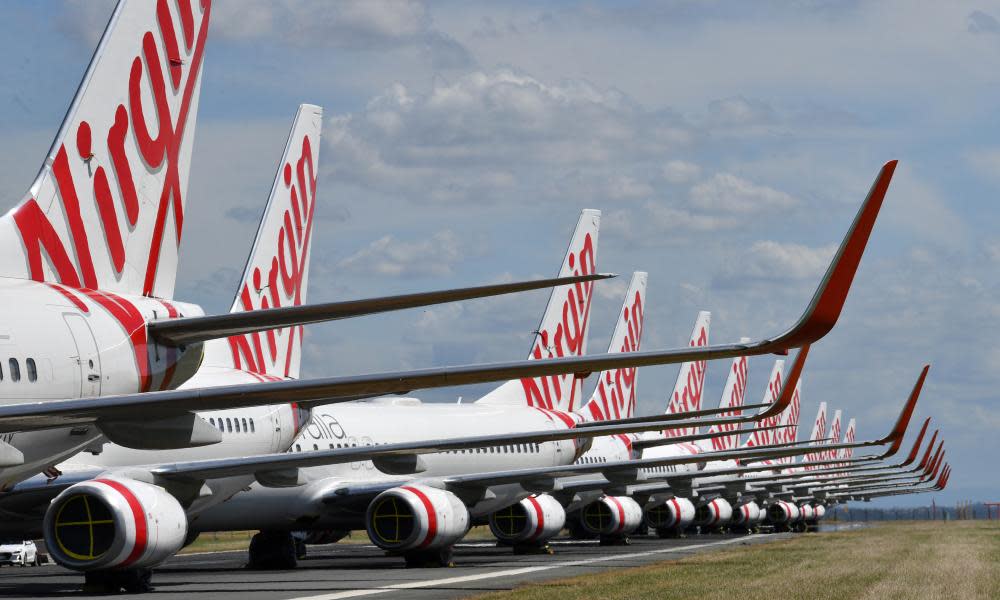Federal budget deficit of $200bn not enough to aid economic recovery, Deloitte says

Australia’s federal budget deficit is tipped to reach an extraordinary $200bn, but the Morrison government should be prepared to go even deeper into the red to support the economic recovery, a new report from Deloitte Access Economics has said.
As the government made a series of pre-budget announcements – including hundreds of millions of dollars to extend funding for domestic airlines – Deloitte also predicted unemployment would remain high for years.
Joblessness is tipped to rise from 7.9% this financial year to 8% the following year before easing to 6.8% in 2022-23, showing the scale of the challenge facing the Coalition as it crafts policies for next week’s budget.
The government has acknowledged austerity policies could hamper the economic recovery and, in a shift in its fiscal strategy, said it would delay any attempt to achieve surpluses until after unemployment was “comfortably” below 6%.
Related: From boom to despair: Sydney's west to suffer Covid symptoms 'for generations'
The government will announce the extension of programs underwriting domestic and regional flight routes on Monday, declaring “planes in the air mean jobs on the ground”.
This will deliver extra support to Qantas and Virgin, as well as regional airlines such as Rex, but the exact amount of funding is unclear because the programs are demand-driven and some routes are affected by state border restrictions.
The government, which has so far spent about $150m on the schemes, said the domestic program would be extended to 31 January and the regional one to 28 March.
The deputy prime minister, Michael McCormack, said regional tourism would “help drive Australia’s economic recovery and today’s announcement of further support for key routes will be a big boost to local economies”.
“The federal government is doing our bit by underwriting these flights to maintain minimum connectivity – now we need the states and territories to do their bit too as we again encourage the continued easing of border restrictions,” he said.
On Sunday the government announced the budget would allocate $250m for a regional tourism package – $200m for infrastructure projects in regional communities and $50m to help businesses in regions heavily reliant on international tourism.
Labor’s finance spokesperson, Katy Gallagher, said her party had long been calling for a rescue package for tourism, which had already lost “hundreds of thousands of jobs”, but the real test would be in how quickly the funding “gets where it’s needed”.
In its report released on Monday, Deloitte Access Economics warned that its prediction of a $198.5bn underlying cash deficit this financial year assumed no new policies were announced – meaning the deficit revealed on 6 October was likely to be even bigger.
The deficit is tipped to decline to $45bn in 2021-22 and then to $26bn in 2022-23.
Deloitte described the budget as “badly bent” but “not broken” because the emergency policy measures to deal with the Covid-19 shock are temporary – while urging federal and state governments to keep up their spending, pointing out that interest rates are at historic lows.
“The emergency Band-Aids are starting to come off – a little earlier than we’d have liked,” said the company’s latest budget monitor report, which coincides with Monday’s reduction in the rate of the jobkeeper wage subsidy. The government reduced the coronavirus supplement to the jobseeker payment last week.
“So both families and businesses are set for a big cash crunch between now and end-March 2021 as emergency responses run out: as jobkeeper and jobseeker are dialled back, as money from early access to superannuation dries up, and as a range of mortgage and rent deferrals run out.”
Despite widespread expectations the government would bring forward the next stages of personal income tax cuts in the budget, Deloitte suggested the government should consider more effective forms of economic stimulus, such as a business investment allowance.
Labor’s shadow treasurer, Jim Chalmers, welcomed the report, saying it “highlights the merits of pro-jobs policies suggested by Labor, including investments in social housing and aged care, a permanently higher unemployment benefit and a business investment allowance”.
“In the face of unacceptably high unemployment, the Morrison government has today cut vital jobkeeper support for millions of Australians, without any jobs plan to replace it,” he and Gallagher said in a joint statement.
The ACTU president, Michele O’Neil, called for the reversal of the jobkeeper and jobseeker cuts, which “come in the lead up to Christmas at the end of an incredibly hard year and will be a huge blow to millions of families”.
The leader of the Greens, Adam Bandt, said on Sunday his party would attempt to stop the cuts to the jobkeeper rate by moving a disallowance motion in the Senate, which he hoped Labor and crossbenchers would support.
“We are not in a position in Australia at the moment to be pushed off that financial cliff, especially in Melbourne,” he told the ABC’s Insiders program.
But the treasurer, Josh Frydenberg, said next week’s budget would “focus on our economic recovery and creating jobs to secure Australia’s economic future”.
Pointing to Deloitte’s view that the budget position would improve if the economy improved, Frydenberg said: “That is why our renewed fiscal strategy focuses on bringing hundreds of thousands of more Australians back to work which will underpin a stronger medium-term fiscal position.”
The Coalition, which campaigned against the former Rudd and Gillard governments on the basis of an alleged “debt and deficit emergency”, is now talking up the need for significant spending to support the economy.
During a visit to South Australia on Saturday, Scott Morrison said Covid-19 had triggered “the worst crisis that most of us have seen in our lifetime” and the budget would herald “the most unprecedented investment in Australia’s future that this country has ever seen”.
The prime minister said the expenditure review committee had been going “over every dollar” to ensure any measures were targeted, proportionate and temporary.

 Yahoo News
Yahoo News 
